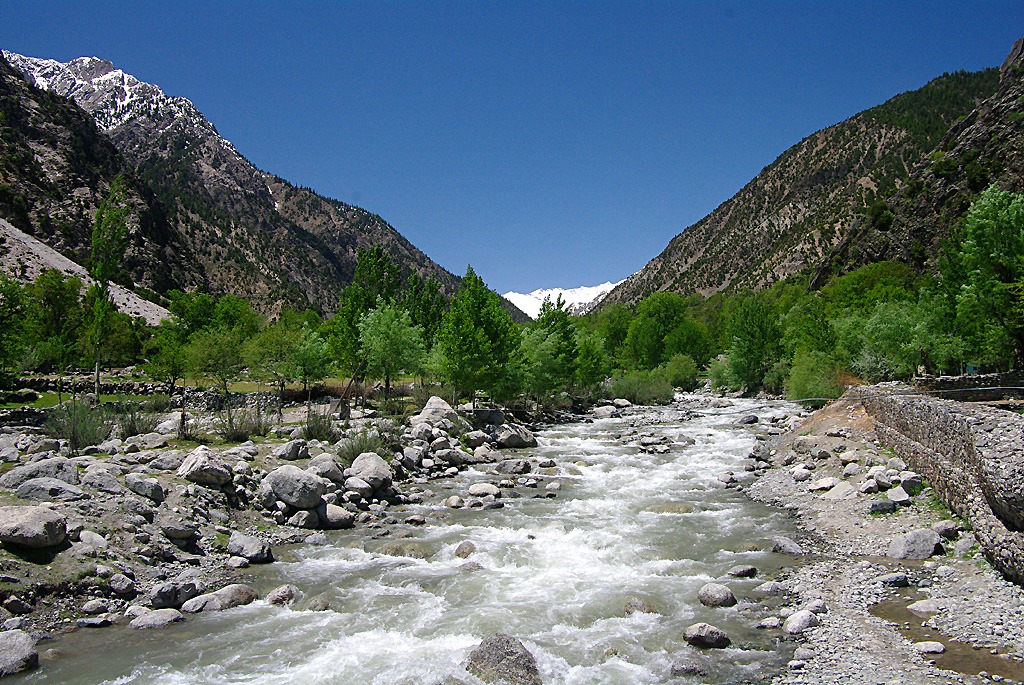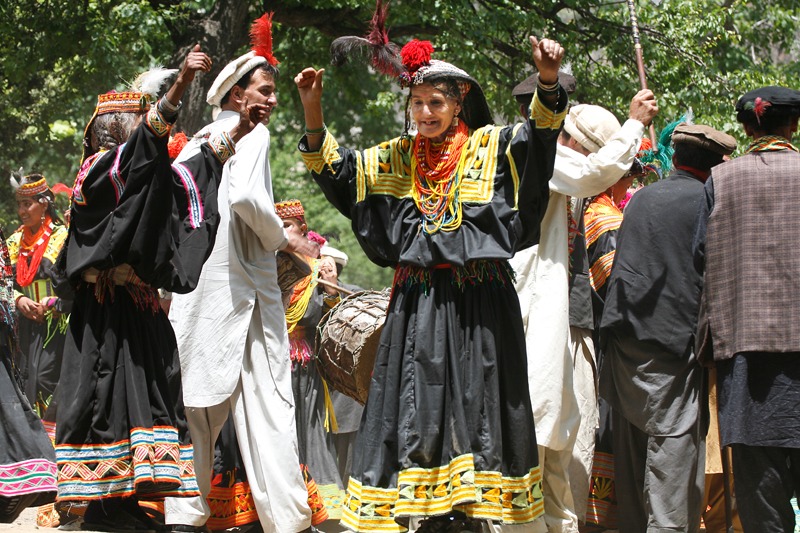Kalasha Valleys
The three valleys of Bumburet, Rumbur and Barir are perhaps the most popular tourist destinations in Chitral district. These valleys are located in the southern gorges of Hindukush Mountains along the border of Afghanistan. These are the valleys where Kalasha people live who are considered the last surviving non-Muslim tribal community in northern Pakistan.
The Kalasha people live in about 12 villages in three mountainous valleys, which are full of lush green fields, natural forests, meadows and natural springs. From Chitral town it takes around two to three hours by jeep to access any of the three Kalash Valleys located at the distance of about 32 to 36 km. Bamburit valley receive largest number of visitors as it has the largest number of hotels among these three valleys. Bamburit has 28 hotels whereas Rambur has 6 and Barir has around 5 hotels and guest houses. Most of these hotel are of small size and there general standard is basic to moderate.
The Kalasha people have a rich culture and are very strong footed about their identity. These people stand out from the remaining tribes, cultures and communities of Pakistan due to their distinct culture, religious practices and festivals. There are three theories about the origin of the Kalash people. Some historians believe that the Kalash are descendants of

the soldiers of Alexander the Great, while the second group believes that According to the third school of thought; the Kalash ancestors migrated to Afghanistan from a distant place in South Asia, which they call “Tsiyam” in their folk songs and epics. However, it is established that the Kalash migrated to Chitral from Afghanistan in the 2nd Century BC. By the 10th century AD, the Kalash ruled a large part of present day Chitral. Their fellow tribesmen in Afghanistan were known as Red Kafirs. The thriving Kalash culture began to fall in 1320 AD, when Shah Nadir Raise subjugated and converted these people to Islam. Today Kalash are one of the world’s most endangered minority communities with a population decreased from 10,000 in 1951 to 4000 in 2017.
With its origins lost in the mists of antiquity, this ancient tribe is unique cultural resource of Chitral. Four festivals mark the highlights of the Kalash calendar. Zoshi, the spring festival, when girls pick the first flowers of the year, is held on May 14-15, it is celebrated with dancing, social visits and the exchange of milk and dairy products. Utchaw is observed from 23-24 Augut to mark the wheat and barley harvest, and involves song, dance and feasting. Phoo is autumn festival and is celebrated in mid-October to mark the grape and walnut harvest, while Chowmoz, from December 10-23, welcome the new year with feasting, drinking, dancing and sacrifice of goats.
Where To Go In Kalasha Valleys
The three valleys of Bumburet (Mumburet), Rumbur (Rukmu) and Barir (Biriu) are the most popular tourist destinations in Chitral district. These valleys are located in the southern gorges of Hindukush Mountains along the border of Afghanistan. These are the valleys where Kalasha people live who are considered the last surviving non-Muslim tribal community in northern Pakistan.
The Kalasha people live in about 12 villages in three mountainous valleys, which are full of lush green fields, natural forests, meadows and natural springs. From Chitral town it takes around two hours by jeep to access any of the three Kalash Valleys located at the distance of about 32 to 36 km.
Bumburet valley receives largest number of visitors as it most developed in terms of facilities and most of the hotels are located in this valley. Rumbur valley is less developed but is more popular with foreign tourists due to its beautiful landscape and more offbeat authentic cultural experience. Birir is the least developed among all there Kalasha valleys and is least visited by the tourists. If you have time you may visit all three valleys but at least you may try to visit Bamburiat and Rambur in one go.
How to Reach Kalasha Valleys from Chitral Town
If you are travelling in a group than best way is to book a private jeep from Chitral on daily rent to visit these valleys. But if you are travelling alone or in a smaller group you may use public transport as well. Direct jeeps and taxi cars usually charge Rs.500 per passenger for one way journey to any of these three valleys from Chitral town. These vehicles usually leave in the afternoon from near Bank Alfalah on the main Road in Chitral Town. The other option is to travel to Ayun bus stop from Chitral which is right on the main road between Chitral and Drosh at a distance of about 14 km. From Ayun, jeeps and cares are more frequently available throughout the day till late evening for Bumburet, Rumbur and Birir. They charge Rs.250 to 300 per passenger. In case there are less passengers they sometime charge more to manage the cost.
Police Registration Domestic and Foreigners Tourists
All the Pakistani tourists are requested to carry their original CNIC with them all the times while travelling in the area of Chitral Valley because at the security checkpoints some time you have to prove your identity by showing it to the staff posted at these check posts. Pakistani visitors going to Kalash Valley are usually registered after crossing the bridge on river at Ayun and also at Dobaz Check Post on the junction of two rivers on the way to Bumburet and Rumbur valleys.
As compare to past practice of compulsory registration of all foreign tourists at local police station and getting compulsory police escort, now foreign visitors are able to freely travel in most areas of Chitral town and Kalasha Valleys without any such compulsory registration with police station. But they need to carry their passport with them to present at the check posts to prove their identity. Please note the foreigners travelling on tourist visa are allowed to travel in norther Pakistan without NOC but those who have any other category of visa such as work visa or diplomatic visa etc. are required to have a NOC from the Ministry of Interior through their respective organizations/embassies.
Entry Fee at Dobaz Check Post
On your way to Kalasha valleys, all the visitors have to register at checkpoint at Dobaz. The Pakistani visits need to pay an entry fee of Rs.20 and foreign need to pay Rs.200 per person. This fee goes to the welfare fund for the Kalasha Community which is managed by the Chitral District Government.
What to Do in the Kalash Valleys
The best time to visit Kalasha Valleys is the time of four seasonal festivals when you will have plenty of opportunity to immerse in the local culture and see the great festivity, colourful traditional rituals and dances and way of life of Kalasha people.
Four festivals mark the highlights of the Kalash calendar. Zoshi, the spring festival, when girls pick the first flowers of the year, is held on May 14-15 every year. It is celebrated with dancing, social visits and the exchange of milk and dairy products. Utchaw is observed from 23-24 August to mark the wheat and barley harvest, and involves song, dance and feasting. Phoo is autumn festival and is celebrated in mid-October to mark the grape and walnut harvest, while Chowmoz, from December 10-23, welcome the new year with feasting, drinking, dancing and sacrifice of goats.
If you visit Kalasha Valleys outside these days you will miss all the colourful festivity but still you will have chance to go on relaxing walks passing through the old traditional villages and see the day to day lifestyle of Kalash people. There are number of short hikes to go to nearby pastures and enjoy

the scenic beauty of this serene mountainous region. A visit to Kalash Museum at Brun Village is a rewarding experience to learn about the rich Kalash culture under one roof.
If you are a trekking enthusiast there are plenty of short hikes in all three valleys to for a day hike. To have a real experience of Kalasha Valleys we strongly recommend you to hire a local tour guides who will not only help you to explore the real charm of this area but will also make your trip safe and secure. Moreover, it will help in generating some economic activity for the locals. STFP has trained more than 40 male and female tour guides and now they are available to provide their services to the local and foreign tourists on reasonable charges. Please ask the reception of your hotel to book a tour guide or visit the Tour Guides section of this website to find a perfect guide for your trip in Chitral.
Mobile networks in the Kalash Valleys
So far Telenor Mobile Network is the best service provider in Kalash Valleys. So make sure to get a sim of Telenor before going to this area.
Where to stay in the Kalash Valleys
Bumburet has mods than 30 hotels and guest houses whereas Rumbur has 6 and Birir has around 5 hotels and guest houses. Most of these hotel are of small size and there general standard is basic to moderate. Please visit the Hotels section to see the list of hotels in Kalasha Valleys. Please note that due to high demand during the festival days most of the good hotels and guest houses are booked well in advance so make your hotel booking in advance if you are planning to go during the festivals days.
Responsible Tourism in the Kalasha Valleys
The Kalash Valleys are naturally and culturally beautiful, but beauty can easily be eroded by the onset of mass tourism. To do your part to preserve the beauty and rich culture of this area, and ensure your tourism has a positive effect, please keep the following things in mind:
- Remember your trip will be a cross cultural experience. Local people commonly ask why tourist come so far to walk in these mountains and experience their simple ways. Try to communicate them what you find enriching about their area and help them appreciate what they have. Explain to them the realities of your home country, good and bad. Bring photographs of your family, home and country to share with your new friends. Discourage smoking and drug use among young people and encourage them to be proud of their culture.
- Kindly also respect Pakistani customs in your dress and behaviour. Women should not wear shorts or revealing blouses. It will be more appropriate if they could wear Pakistani salwar-kamiz. For men, knee-length hiking shorts are better than jogging shorts, and always wear a shirt. Avoid physical displays of affection publicly.
- Be respectful of religious places. Heads should be covered and shoes removed before entering any mosque or shrine. Modestly and neatness are especially appreciated when visiting religious places.
- Get permission before taking photographs and respect people’s right to privacy.
- Giving money, pens, candy etc. to begging children creates a patron-pauper consciousness and should be strictly avoided. Instead, make a positive contribution to a school or a community health centre of the local NGO which will benefit the entire community. You can also promote local art and crafts by buying local handicrafts.
- Litter is unattractive, harmful to wildlife and can increase vermin and disease among people. Plan your visit to reduce rubbish, and carry out what you carry in. Similarly do not pollute water courses and mountain water streams.
- Treat forests, animals and birds with care and respect. They are unique and rare. Do not damage, disturb or remove any tree, plants or animals. Do not purchase animal parts and products.
- Above all, remember that your vacation has a great impact on the natural environment and the people of this area. By making an effort and taking the above points into consideration you could help the natural environment and local communities enormously.
